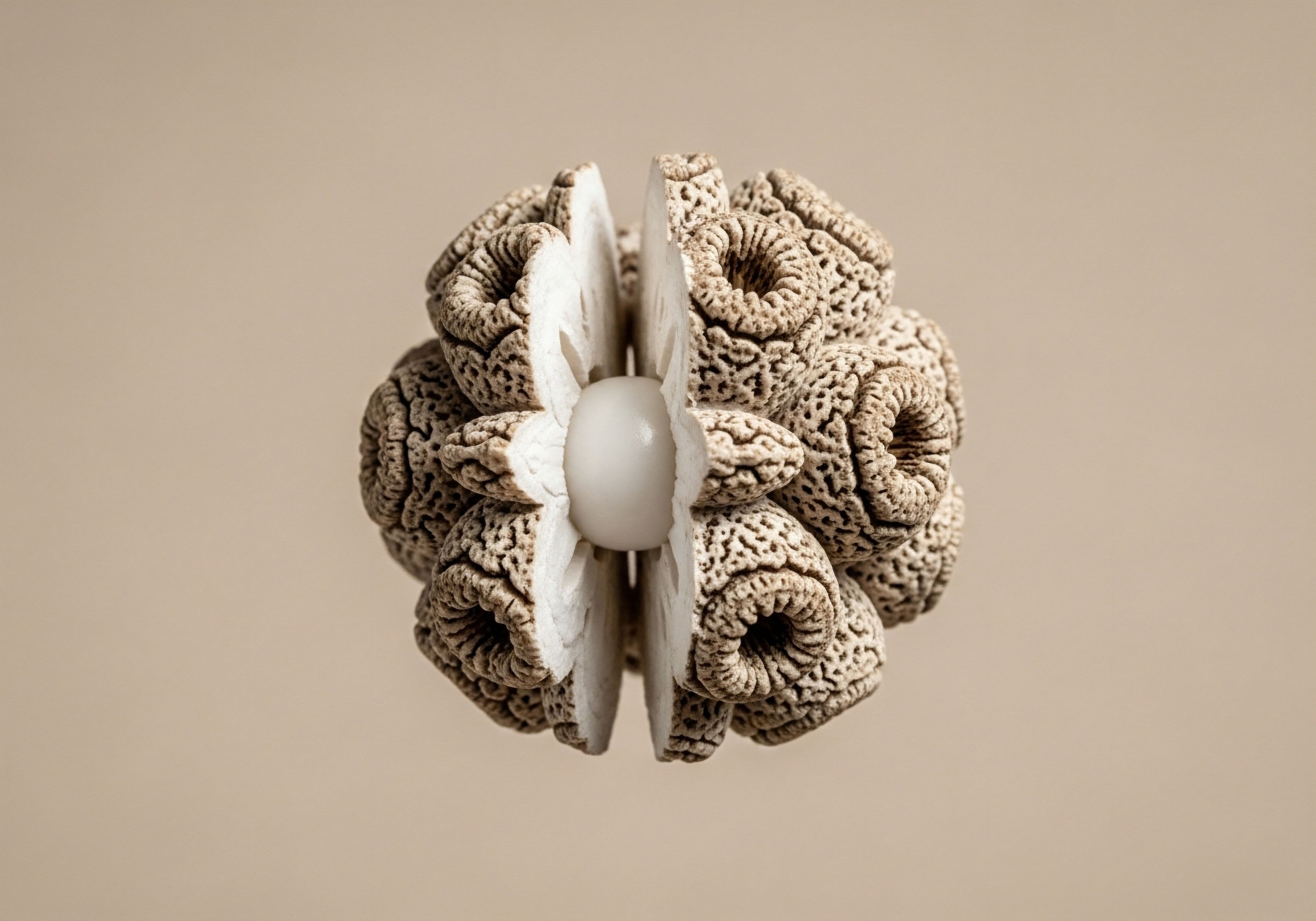

The Silent Architect of Renewal
The human organism operates as a sophisticated, high-performance system, designed for peak output. Yet, many navigate existence with systems running at suboptimal levels, accepting a diminished state as inevitable. The true frontier of human potential extends beyond waking hours, into the profound, transformative period of nightly restoration. This is a time when the body executes its most critical maintenance protocols, a biological reset essential for sustained vitality and peak cognitive function.
Consider the intricate orchestration of endocrine signaling during sleep. Testosterone production, for example, peaks during deep sleep cycles, particularly in young men. Cortisol, the stress hormone, follows a diurnal rhythm, declining at night to allow the body to recover, then rising to prepare for the day’s demands. Disruptions to this delicate balance impact metabolic health, immune response, and cognitive sharpness. The body performs its most essential repair work when the conscious mind disengages.
Clinical data consistently demonstrates that sustained sleep deprivation elevates inflammatory markers and impairs glucose metabolism, compromising long-term physiological integrity.

Cellular Deep Cleanse
The brain itself undergoes a unique detoxification process during sleep. The glymphatic system, a network of perivascular channels, becomes significantly more active, flushing metabolic waste products, including amyloid-beta proteins, which accumulate during waking hours. This nightly cleanse maintains neural plasticity and cognitive acuity. Without adequate time for this crucial operation, neural pathways experience congestion, leading to mental fog and reduced processing speed.
Beyond the brain, cellular repair mechanisms operate at full capacity. Growth hormone, a powerful anabolic peptide, surges during slow-wave sleep, orchestrating tissue repair, muscle protein synthesis, and fat metabolism. This hormonal surge contributes directly to physical recovery and body composition management. Interrupted sleep cycles blunt this natural regenerative process, hindering recovery from physical exertion and impeding progress toward aesthetic and performance goals.

The Endocrine Recalibration
The entire endocrine system relies on consistent, high-quality sleep to maintain equilibrium. Insulin sensitivity improves, leptin and ghrelin ∞ hormones regulating appetite and satiety ∞ recalibrate, and the thyroid gland performs its regulatory functions. A compromised sleep environment leads to systemic hormonal dysregulation, contributing to weight gain, chronic fatigue, and a blunted stress response. We stand at a unique vantage point, understanding these internal systems with unprecedented clarity, ready to implement targeted interventions.


Engineering Nocturnal Revival
The path to biological recalibration involves a meticulous, multi-pronged approach, focusing on creating an environment conducive to deep, restorative sleep. This extends beyond simple duration; it encompasses the quality and architecture of sleep itself. The goal involves precise interventions that optimize the body’s natural regenerative processes.

Optimizing the Sleep Environment
The sleep sanctuary demands specific attention. Light exposure, particularly blue light from screens, disrupts melatonin production, signaling to the brain that it remains daytime. Dimming lights in the evening, employing blue-light blocking glasses, and removing all electronic devices from the bedroom establish a clear circadian signal. Temperature control proves equally critical; a cool room, typically between 60-67°F (15-19°C), facilitates the initiation and maintenance of deep sleep.
Sound plays a significant role. Eliminating ambient noise with earplugs or utilizing white noise generators creates an auditory shield, preventing disturbances from impacting sleep cycles. These foundational elements prepare the nervous system for its nightly shutdown sequence.
A reduction in core body temperature of approximately 1°C correlates with the onset of deep, slow-wave sleep, underscoring environmental temperature’s physiological impact.

Strategic Nutritional Timings
Nutrient timing significantly impacts sleep quality. Consuming heavy meals close to bedtime diverts metabolic energy to digestion, away from restorative processes. A final meal three to four hours before sleep allows for adequate digestion. Specific macronutrient ratios also contribute. A balanced intake of complex carbohydrates and lean protein in the evening supports stable blood sugar levels throughout the night, preventing disruptive nocturnal awakenings.
Magnesium, a mineral involved in over 300 enzymatic reactions, plays a role in relaxation and sleep. Supplementation with specific forms, such as magnesium L-threonate, demonstrates neuroprotective properties and supports sleep architecture. Other targeted supplements, like L-theanine or apigenin, can modulate neurotransmitter activity, promoting a state of calm conducive to sleep.

Hormonal Modulations
For some, precise hormonal interventions elevate sleep quality and recovery. Testosterone Replacement Therapy (TRT), when indicated, can restore physiological levels, positively impacting sleep architecture, mood, and overall vitality. Similarly, specific peptides, such as Growth Hormone Releasing Peptides (GHRPs) like Ipamorelin or Sermorelin, stimulate the body’s endogenous growth hormone production. This augments the natural anabolic and reparative processes occurring during sleep, accelerating recovery and cellular regeneration.
These advanced strategies represent a systems-level approach, fine-tuning the body’s internal chemistry to maximize nocturnal restoration.
- Environmental Control ∞ Eliminate blue light exposure two hours before bed. Maintain a cool, dark, quiet sleep space.
- Nutritional Discipline ∞ Cease caloric intake 3-4 hours pre-sleep. Consider targeted magnesium or L-theanine supplementation.
- Movement Protocol ∞ Engage in regular, vigorous exercise, concluding workouts several hours before bedtime.
- Mindset Management ∞ Implement a consistent wind-down routine to signal the body it is time for rest.


The Cadence of Transformation
The impact of nightly restoration unfolds across distinct timelines, revealing immediate benefits and cumulative, long-term physiological shifts. This process is not a fleeting intervention; it embodies a sustained commitment to biological mastery, yielding returns that compound over time. The cadence of transformation reflects the body’s adaptive capacity when provided with optimal conditions.

Immediate Returns
Within days of implementing a rigorous nightly restoration protocol, individuals experience enhanced cognitive function and mood stability. The immediate returns include improved focus, sharper decision-making, and a more resilient emotional state. Physical recovery from training sessions accelerates, evidenced by reduced muscle soreness and increased energy for subsequent workouts. These early indicators validate the power of prioritizing sleep, offering tangible proof of the body’s responsiveness.
Metabolic markers begin to stabilize rapidly. Blood glucose control improves, and the initial signals of hormonal recalibration manifest as reduced cravings and more consistent energy levels throughout the day. This swift shift provides the impetus for sustained adherence to the protocol.

Mid-Term Reshaping
Over several weeks to months, the benefits deepen and expand. Body composition shifts, with a reduction in adipose tissue and an increase in lean muscle mass, reflecting the sustained anabolic environment created by optimized sleep and growth hormone pulsatility. Immune system robustness becomes apparent, with fewer instances of illness and a more vigorous response to pathogens.
For those engaging in hormonal optimization, such as TRT or peptide protocols, the full spectrum of their effects becomes pronounced during this period. Sleep becomes a force multiplier for these interventions, accelerating tissue repair, mitigating age-related decline, and elevating overall physical and mental performance. The synergy between external intervention and internal restoration creates a powerful, transformative effect.

Long-Term Biological Mastery
The true measure of this commitment lies in the sustained, long-term effects. Years of consistent nightly restoration translate into significant gains in longevity and sustained vitality. The reduced burden of chronic inflammation, optimized metabolic function, and preserved cognitive health collectively contribute to a prolonged healthspan. Individuals maintain peak performance well into advanced age, defying conventional expectations of decline.
This trajectory illustrates a proactive stance against biological entropy. It reflects a deliberate choice to engineer a life of sustained high performance, built upon the bedrock of consistent, high-quality sleep. The body, when given the precise conditions for nightly renewal, exhibits an extraordinary capacity for self-repair and sustained excellence.

Beyond the Waking World’s Demands
The prevailing narrative often celebrates relentless waking productivity, yet the deepest transformations unfold during the quiet hours of nightly restoration. This is where true biological recalibration occurs, a systemic reset preparing the organism for its highest expression. The commitment to engineering superior sleep represents a fundamental act of self-mastery, an intelligent investment in enduring vitality.
This approach recognizes the body as a finely tuned instrument, capable of sustained excellence when provided the precise conditions for its nightly renewal. The future of human performance resides in understanding and leveraging these profound, often overlooked, nocturnal processes.



